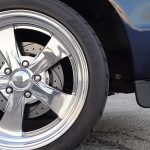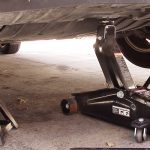The exhaust system removes carbon dioxide and water vapor as byproducts of combustion. You will often notice droplets from your exhaust pipe, especially during the cold season.
So, why is water coming out of the exhaust? How can I fix it? Water, in small amounts, mainly comes out as a byproduct of the combustion process. However, too much water from the exhaust can be due to faulty pistons, blown gasket heads, coolant leaks, or as a product of the catalytic converter.
This article reviews why water comes out of the exhaust and whether it is okay or not for it to come out of the tailpipe. In addition, we give tips on how to fix the situation and avoid its reoccurrence.
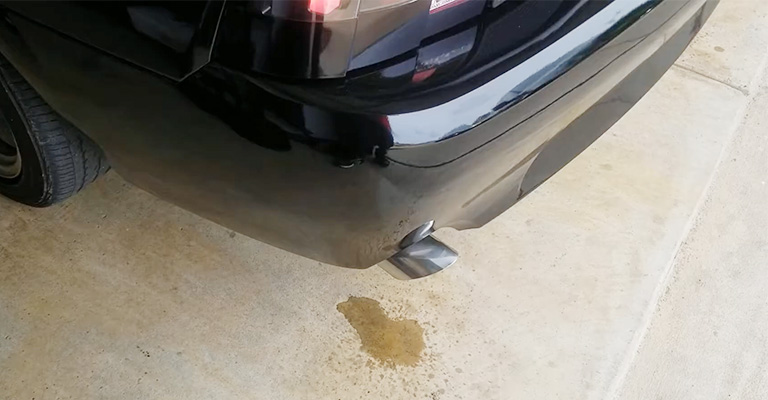
Is It Okay For Water To Come Out Of The Exhaust?
Water from the exhaust pipe is a byproduct of the combustion process in the engine. It is expelled as water vapor due to the high temperatures. As it travels through the system significantly during cold seasons, it cools down and leaves as droplets.
So yes. It is okay for small amounts of water droplets to come out of the exhaust. However, too much water from the exhaust should signal a possible engine problem.
It is more worrying when the water is colored, indicating a mixture of water and other liquids. In such instances, there is a need to have the engine exhaust system fixed.
Why Is Water Coming Out Of Exhaust? How To Fix?
Let’s review the possible causes of water coming out of the exhaust pipe and the possible solution to fix them.
Water Vapor Condensation In The Exhaust System
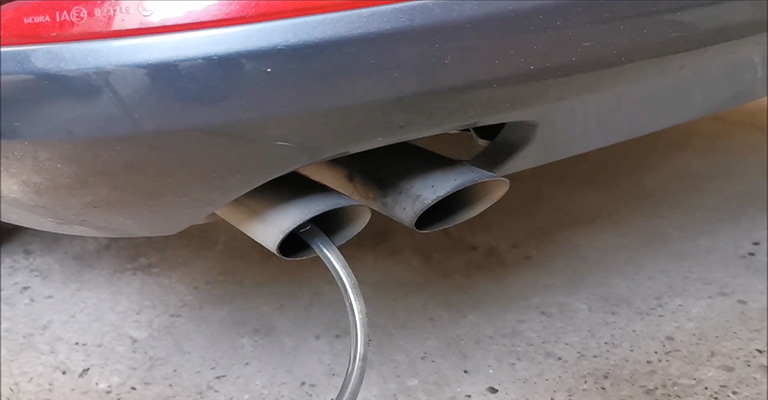
Water vapor is expelled as the engine runs, and fuel combustion occurs. In the engine, the water byproduct is vaporized by the high temperatures.
However, as the vapor leaves the engine, it condenses and forms water droplets along the exhaust system. In the condensation process, water mixes with carbon dioxide byproducts. You will see water droplets in normal conditions once the system is cool.
How To Fix?
These droplets are standard and raise no alarm or need to call a mechanic. Instead, it indicates a healthy engine.
Coolant Leaks
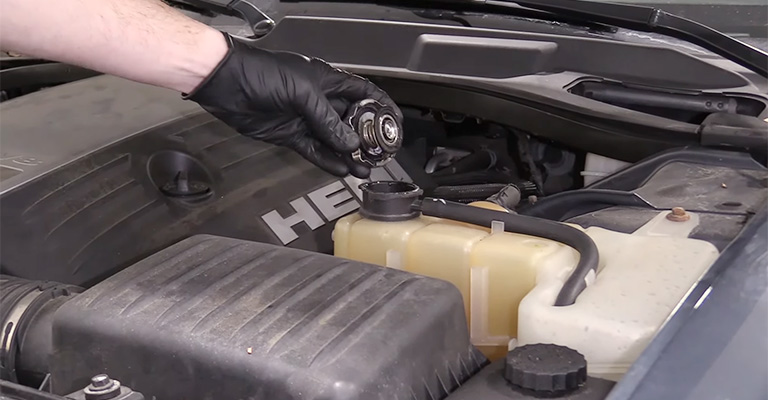
A coolant is an antifreeze agent put in the engine to stabilize the internal temperatures. A cracked or broken coolant reservoir, engine block, and cylinders cause coolant leakage.
The cracked parts leak the coolant, which finds its way into the exhaust pipe. It is a clear liquid that flows out as water from the exhaust pipe. You will often have a sweet smell coming from the exhaust.
Another indicator of coolant leakage is an overheating engine. Since the coolant is meant to stabilize the engine’s temperature, when it leaks, the engine runs at a high temperature that can damage it.
How To Fix?
Coolant leakage is dangerous if not addressed.
- Repairing the broken or cracked parts is terminal as you seek mechanic help
- Replace the engine block if the whole engine is cracked
- If only some features are affected, replace them with their corresponding parts
A Blown Gasket Head
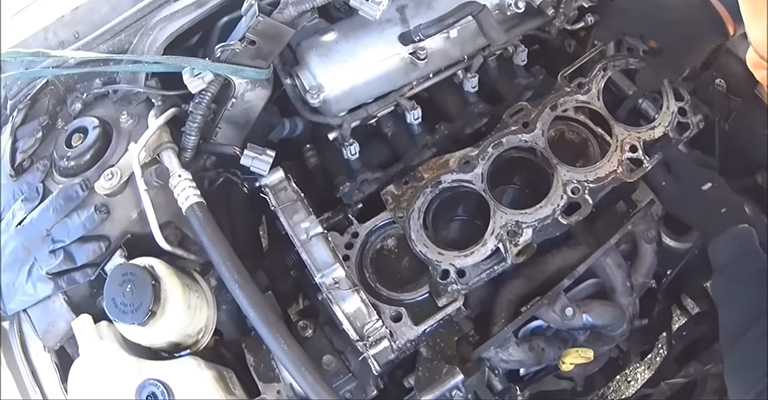
Blown gaskets are among the causes of too much water from the exhaust. Head gaskets primarily keep the engine liquids, such as oil and coolant, from mixing with the combustion fuel mixture.
If the engine overheats, the head gasket fails and gets blown out, leading to the mixing of engine fluids and fuel. A clear indication of a blown head gasket is a cloud of white smoke from the exhaust pipe combined with too much water.
The gasket lifespan is limited to a maximum of 50,000 miles.
How To Fix?
The solution to a blown or leaking head gasket is to replace it with a new one. Replace with its exact OEM spare part. Make a routine to check and replace if worn out or blown out.
Ensure the engine coolant is replenished to avoid overheating, which affects the head gasket.
Faulty Pistons And Piston Rings
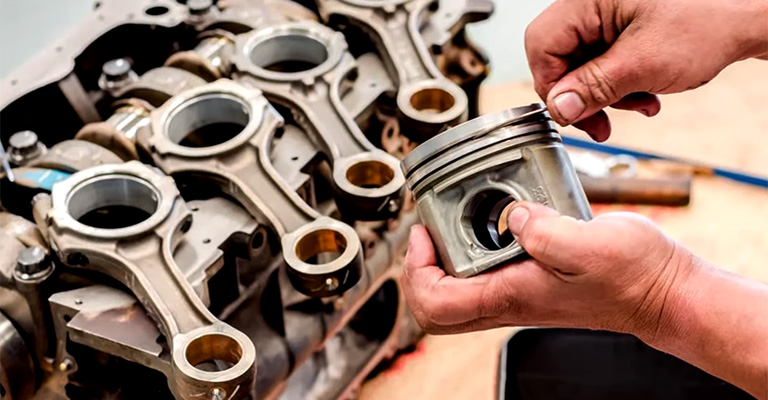
Pistons inside the combustion cylinders help convert the energy produced into mechanical energy to drive the crankshaft that powers the wheels.
Piston rings prevent the fuel mixture from escaping when compressed between the piston and combustion cylinder walls. The rings also prevent contact between the piston and the walls.
Faulty pistons and rings allow the mixing of fuel and oil in the engine. This results in water coming out of the exhaust pipe. When the rings and the gaskets are damaged, a blueish smoke and sweet scent come out of the tailpipe with a lot of water.
How To Fix?
Replace the pistons if broken or worn out before they damage the cylinder walls. Also, replace the piston rings to keep the piston from coming into direct contact with the cylinder walls.
FAQs
Read through the following frequently asked questions to have a better understanding of the remaining confusion about the water coming out of the exhaust.
Q: What Does Colored Water From The Exhaust Mean?
Water coming out of an exhaust pipe is normal if it’s expelled in small amounts of clear water droplets. Colored water in the exhaust indicates a possible mixture of water and other engine fluids, such as oil and coolant.
In some occasions, the colored fluid may not be water but rather an oil and coolant mixture from a broken or cracked oil and coolant reservoir.
Q: What Amount Of Water Is Considered Okay Coming Out Of Exhaust?
When cold, the water vapor condenses, leading to an excess of water with little water vapor.
While starting your car, a few drops can be considered okay, but they should disappear once the engine warms up. Any excess water continuously dripping from the exhaust should be regarded as abnormal.
Q: What Can I Do To Stop Water From Coming Out While Revving?
At times, it’s normal for water to come out of the exhaust while revving. To avoid this, allow the engine to run for a few minutes before starting to drive.
If the condition persists even after covering a long distance, consult a mechanic for a diagnosis.
Conclusion
Water droplets from the exhaust pipe are a standard case for any vehicle. It is more visible during the cold season as water vapor condenses along the exhaust system. The catalytic converter also contributes to the purification process of exhaust gasses.
The water vapor that comes out as condensed water is a byproduct of the combustion process in the engine. However, if your engine parts are faulty, you may see excess water from the exhaust pipe.
Have a mechanic inspect the vehicle and recommend the best fix to avoid causing more harm to the engine. Frequent services and proper maintenance can help prevent these problems from happening.

